Eight years ago, I recall investing a big chunk of money in an ambitious Bali rental cottage project that was supposed to be completed in a year and a half. Instead, I ended up helplessly watching the construction delay drag on for two more years and getting my funds stuck. Being on the verge of giving up real estate investing entirely, I got involved in a few property syndication deals for the first time, which turned out to be a spectacular success. This gave me new hope and confidence in real estate investment opportunities and has now resulted in this article.
Key Findings:
- Syndication Purpose: Real estate syndication is a form of partnership between multiple investors and syndicators (sponsors) to acquire, manage, and earn real estate assets.
- Syndication Benefits: Real estate syndication allows you to diversify your portfolio, lower your entry threshold, simplify property management, and increase liquidity compared to traditional real estate investments.
- Syndication Platforms Overview: Syndication platforms range from traditional to tokenized and offer a variety of syndication options, catering to investors with different needs.
- Syndication Legal Overview: Before investing, you should learn securities laws, choose the appropriate entity structure, and understand specific agreements to ensure compliance and secure investments.
- Three Case Studies: Explained the essence of syndication with specific investment examples from CrowdStreet, Fundrise, and Binaryx.
Understanding Real Estate Syndication
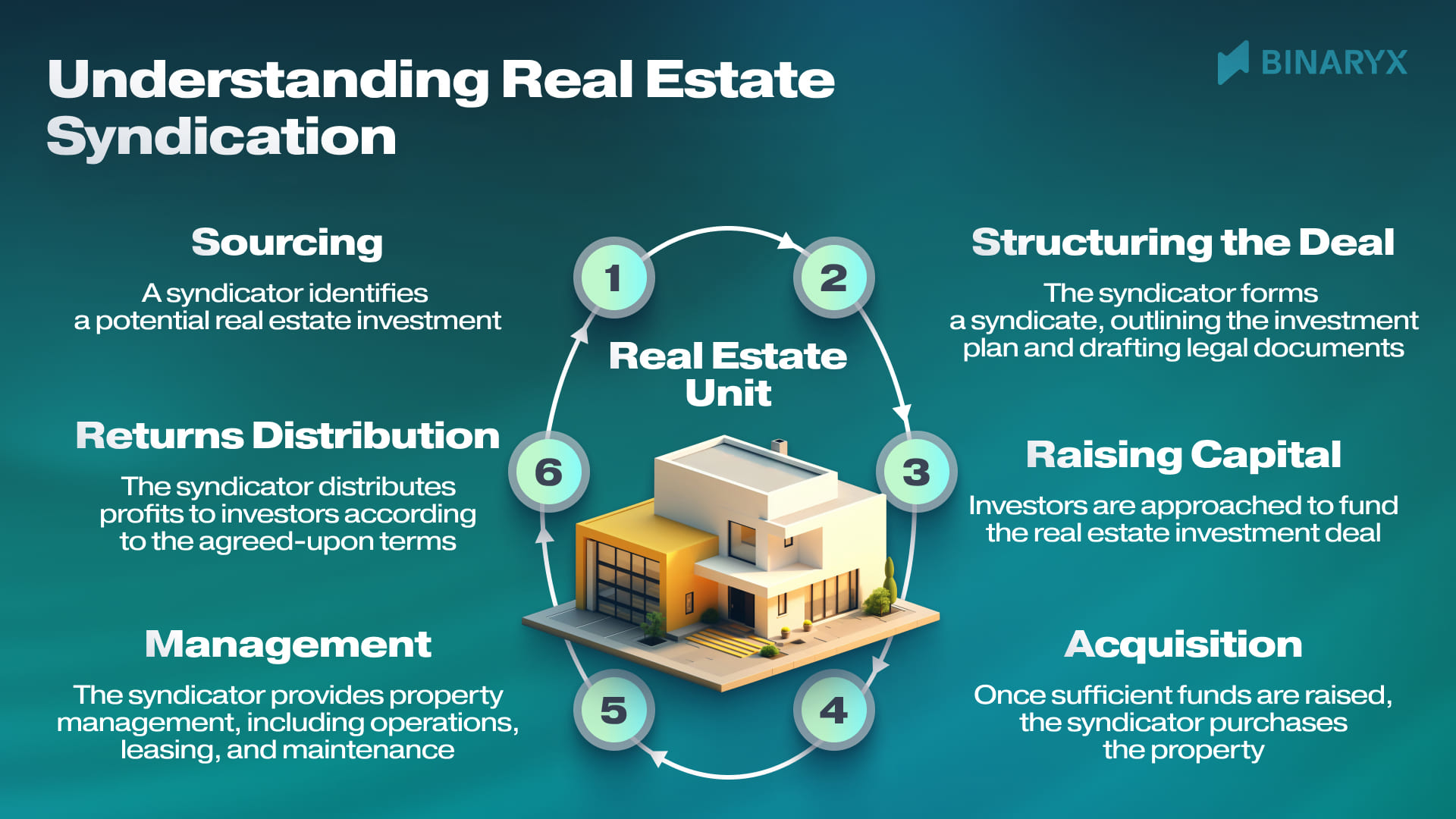
What is Real Estate Syndication?
Real estate syndication is a form of partnership between multiple real estate investors and syndicators (sponsors) to acquire, manage, and earn real estate assets. Syndicators are responsible for finding, acquiring, syndicating, and managing the property, while investors provide the necessary funds. Sometimes the partnership involves intermediaries like real estate agents, lawyers, management organizations, etc.
How Does Real Estate Syndication Work?
The syndication process typically consists of the following steps, sometimes with extra features:
- Sourcing the deal: A syndicator identifies a potential real estate investment.
- Structuring the deal: The syndicator forms a syndicate, outlining the investment plan and drafting legal documents.
- Raising capital: Investors are approached to fund the real estate investment deal.
- Acquisition: Once sufficient funds are raised, the syndicator purchases the property.
- Management: The syndicator provides property management, including operations, leasing, and maintenance.
- Returns distribution: The syndicator distributes profits to investors according to the agreed-upon terms.
Types of Real Estate Syndication
- Equity syndication: Investors contribute capital in exchange for property ownership shares, with profits distributed based on ownership percentages.
- Debt syndication: Investors provide loans to finance a property acquisition and get interest payments.
- Hybrid syndication: Investors may provide capital in exchange either for ownership shares or interest payments.
Usually, most of us don't like to lend money, which is why equity syndication remains the preferred type. Who wouldn't want to own an upscale villa or apartment, even if only a small part of it is to be owned?
Benefits of Real Estate Syndication
And while you can think of many benefits, four stand out as essential. These benefits address the fundamental challenges of traditional real estate – the very challenges that likely led you to this article in search of solutions.
- Diversification of investment portfolio: Real estate syndication allows you to diversify your portfolio by investing in different types of properties across various locations. Depending on the syndication solution you choose, you can invest in a few projects or several hundred at a time. On modern investment platforms, you can also adjust your stake in the investment unit to values that are multiples of $50 or $100.
- Lowered entry threshold: If you want to invest in real estate properties but don't yet have the capital to purchase a property outright, syndication provides the solution you seek. The entry threshold can vary from $50 to $30,000, depending on the syndicator.
- Hassle-free investment: You no longer have to manage the property yourself, which consumes time and energy. A professional management company handles all aspects of management, from acquisition to rent payments, while all you have to do is take the end profits minus fees.
- Enhanced liquidity: If you need to sell a property, the process can often take several months due to the difficulty of finding a suitable buyer. At the same time, there will always be more people willing to buy a share of the property. While on a specialized platform, a sale can even take minutes.
How Does Real Estate Syndication Differ from Real Estate Investment Trust?
Real estate syndication and REITs differ primarily in asset focus and ownership structure. With a REIT, investors buy shares in a company that holds a portfolio of properties in order to receive regular dividends from the management company. In syndication, investors collectively buy a specific property through a specifically created Limited Partnership (LP) or Limited Liability Company (LLC) in order to collectively manage this property and share rental income. So, REIT investors own shares of a real estate management company and collect dividends, whereas syndication investors hold property ownership stakes and collect a share of rental payments.
Typically, while comparing REITs with syndication investments, other researchers mention more differences, such as access to the investment, investment minimums, and liquidity. But, since we introduced a broader understanding of syndication by including crowdfunded and tokenized forms, those are no longer relevant. REITs are sometimes even distinguished as a form of real estate syndication. However, this leads to excessive definition blurring, so it is better to separate the two.
Getting Started with Real Estate Syndication
Basically, if you are able to independently negotiate with other investors, create an appropriate structure, and collectively purchase a real estate unit, you can do that. However, a simpler way would be to use an existing platform on the market. There are several platforms to cater to different investor needs and preferences. These platforms can be broadly categorized into traditional real estate syndication platforms, real estate crowdfunding platforms, and real estate tokenization platforms.
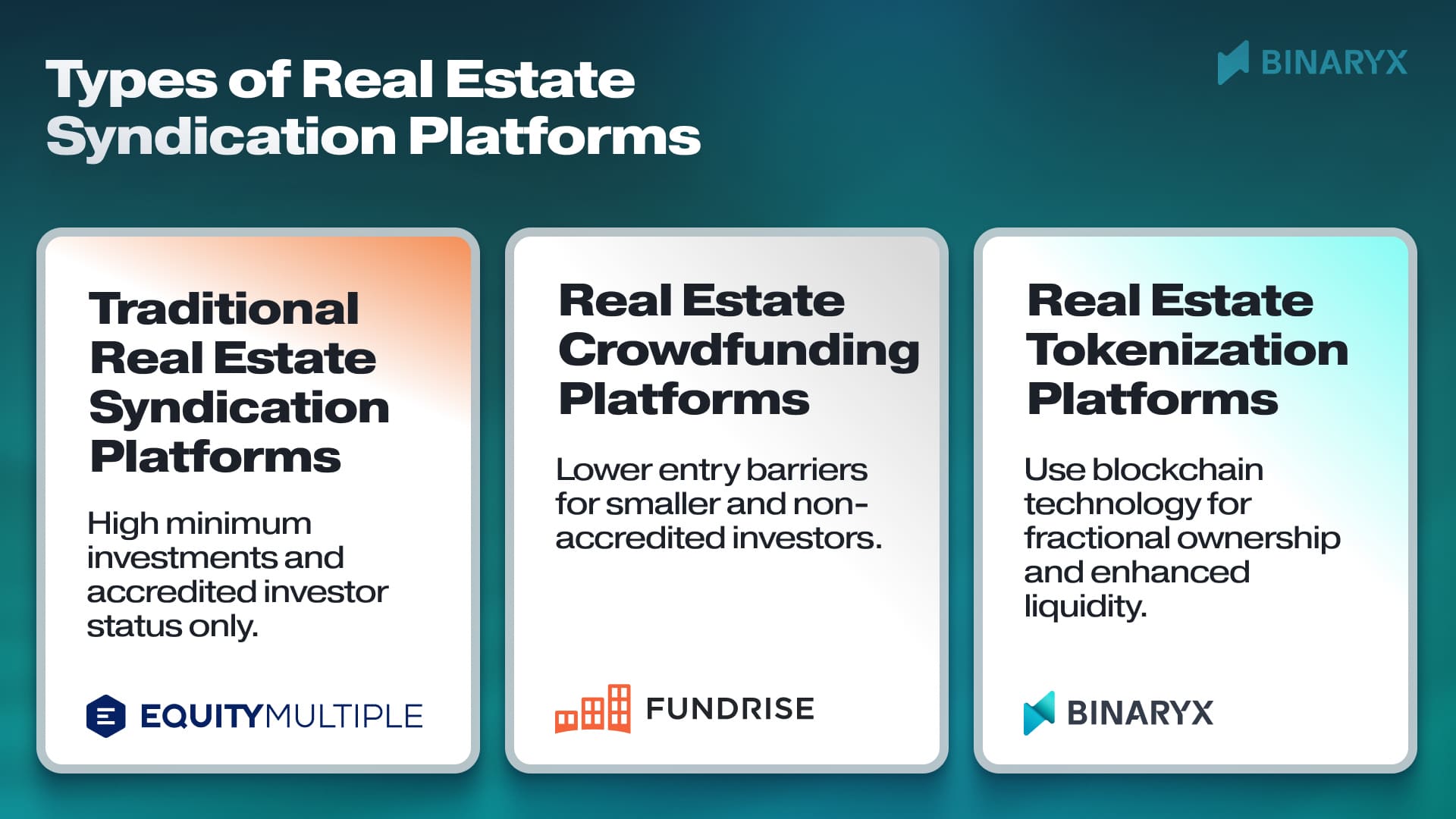
Traditional Real Estate Syndication Platforms
Traditional real estate syndication platforms allow investors to pool funds to invest in various real estate projects and typically require high minimum investments and accredited investor status. Here are a few of the best-known:
- EquityMultiply. EquityMultiple is a US-based real estate syndication platform exclusively for accredited investors, with a minimum investment requirement of $5,000. Fees are investment-dependent, typically ranging from 0.5% to 1.5%, plus an origination fee. The platform offers short-term, long-term, and high-yield real estate opportunities.
- CrowdStreet. CrowdStreet offers access to a range of commercial real estate projects in the US. The platform charges investors zero fees for individual deals, instead charging syndicators to pay a 1.5% technology fee. Despite the word “crowd” in the name, it’s not actually designed for a crowd since the platform requires US-based investor accreditation and a minimum investment amount of $25,000 for most offerings.
- RealtyMogul. RealtyMogul offers both syndicated individual project investments and REIT funds for non-accredited and accredited investors on the USS market. The platform provides access to individual project investments with minimums ranging from $25,000 to $35,000 for accredited investors, charging organizational fees of 3%, an asset management fee of 1-1.25%, and a servicing fee of 0.5%.
Real Estate Crowdfunding Platforms
Real estate crowdfunding is the next evolutionary form of traditional real estate syndication. These platforms allow the pooling of funds from a larger number of smaller investors, including non-accredited ones. Unlike traditional syndication, which typically requires high minimum investments and involves a limited group of accredited investors managed by a syndicator, crowdfunding platforms democratize real estate investment by offering lower entry barriers. Here are some to look at:
- Fundrise. Fundrise is one of the first real estate crowdfunding platforms to achieve business success. The platform provides access to various US real estate debt and equity investments with a low minimum of $10 for brokerage accounts and $1,000 for IRAs. Fundrise charges a 0.15% advisory fee for all assets, with additional fees for specific funds and services.
- Arrived. Arrived is focused on rental home and vacation home markets in the US, offering a minimum investment of $100 per property unit. The platform charges a 3.5% sourcing fee and a 0.15% AUM fee for long-term rentals, while vacation rentals require a 5% sourcing fee, a 5% gross rent fee, and variable management fees.
- GetStake. GetStake is focused on MENA real estate syndication, currently offering properties in Dubai. Investors can start with as little as 500 AED (~$136). The platform charges a 1.5% acquisition fee, a 0.5% annual management fee, a 0.2% initial KYC/AML fee, and a 0.1% annual KYC/AML fee from the second year. Upon exit, there is a 2.5% exit fee and a 7% performance fee on profits.
Real Estate Tokenization Platforms
Real estate tokenization platforms represent another step forward; using blockchain technology, they tokenize syndicated property assets and offer fractional ownership through digital tokens. This feature enhances liquidity and transparency, enabling investors to buy and sell property shares on permissionless blockchains. These platforms typically require nothing more than a simple KYC procedure. Here are the most advanced:
- RealT. RealT is the first real estate tokenization platform in the market. The platform allows investing in middle- and lower-middle-class rental properties in the US starting with $50; however, Panama options were recently launched. RealT charges a 3% processing fee for token sales conducted through the platform.
- Lofty. Lofty is focused on middle- and upper-middle-class real estate rentals in the US. You can start investing with $50. The platform charges a 3% fee for every transaction on their marketplace.
- Binaryx. The Binaryx platform offers a wide range of investment options. Investors can currently explore options in rental properties and projects under construction in Bali and Montenegro, with the Dubai options about to be launched. You can start with as little as $500. Binaryx charges a 3% fee for selling property tokens on the secondary market.
Looking at Real Estate Syndication Case Studies
Let's assume you have a $25,000 budget for real estate investing and you have decided to use one of the syndication platforms to make an investment. Consider three case studies.
CrowdStreet Case Study
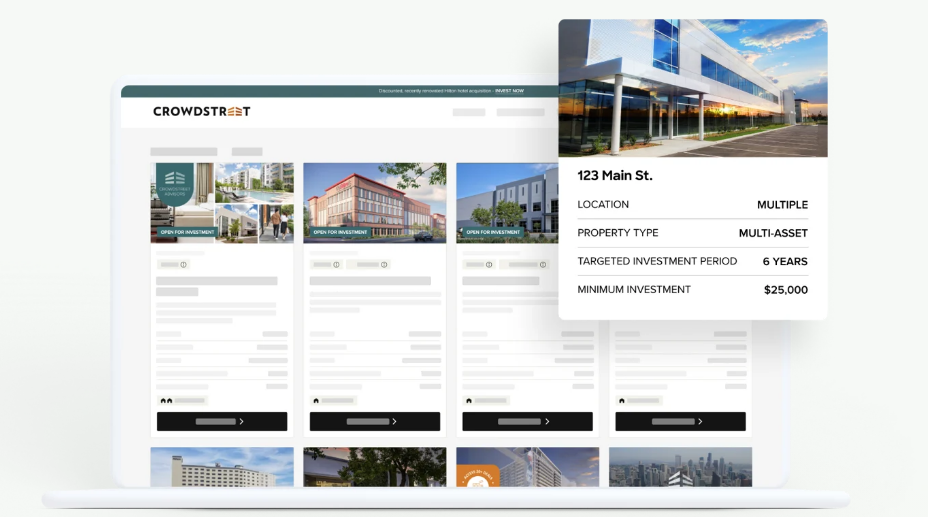
- Investment type: Development of a mixed-use property in Austin, Texas;
- Amount invested: $25,000;
- Projected returns: 70–85% overall ROI over a 5-year holding period;
- Potential outcome: During the 5-year holding period, the project involved developing a mixed-use property with residential units, retail spaces, and office areas. You received distributions from rental income totaling $7500 (30% of the initial investment). At the end of the fifth year, the property was sold, providing an additional return of $11,250 (45% of the initial investment).
- Total returns: $18,750 (75%)
- Total portfolio value if not sold: $43,750
Fundrise Case Study
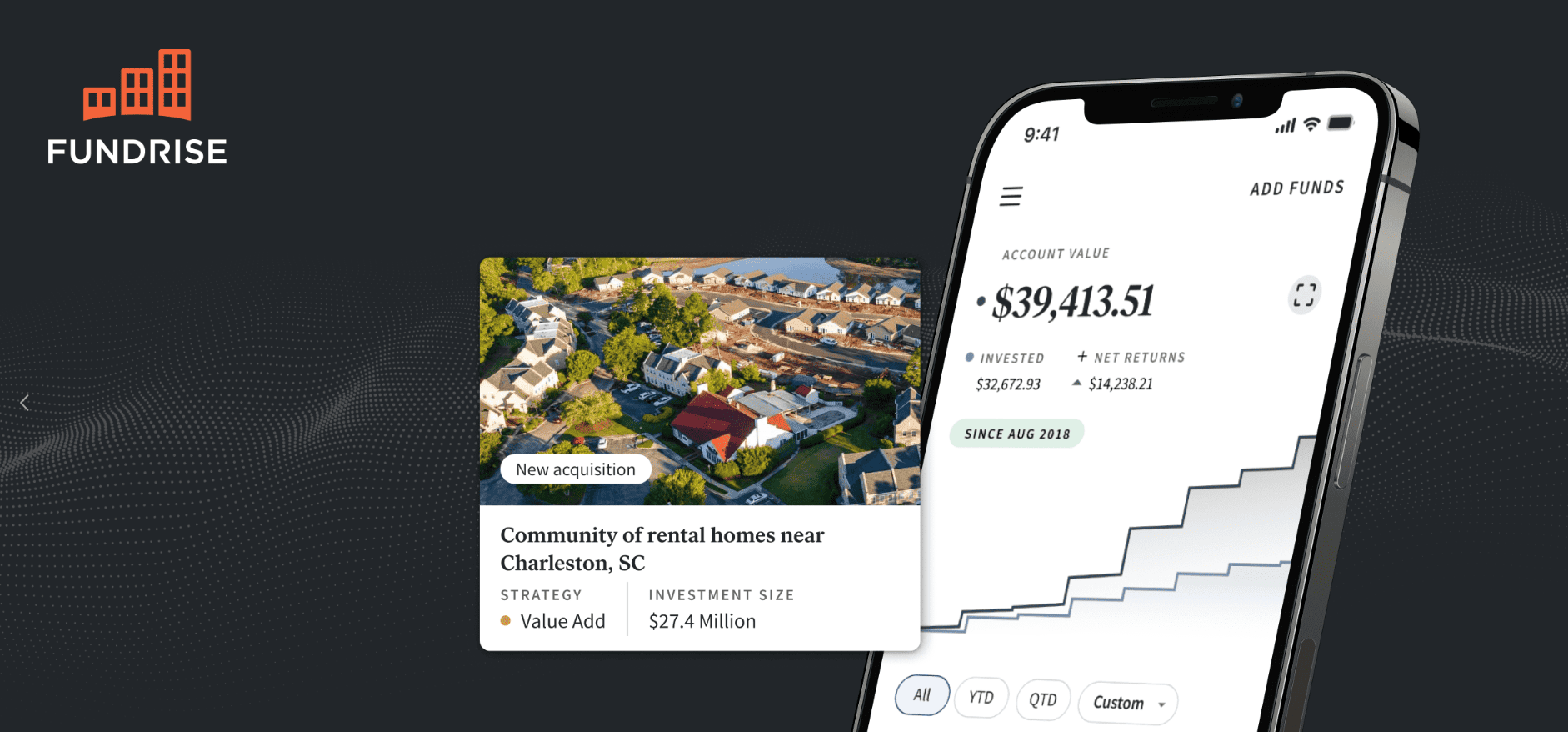
- Investment type: A portfolio of 5 rental property units across the US;
- Amount invested: $25,000 ($5000 each);
- Projected returns: 40–60% overall ROI over a 5-year period;
- Potential outcome: Over the 5-year period, your portfolio achieved an average annual return of 11% APR. Total cumulative returns over 5 years: 55% ROI. For each $5,000 investment, the total returns amounted to $2,750 (55% of $5,000).
- Total returns: $13,750 (55%)
- Total portfolio value if not sold: $38,750
Binaryx Platform Case Study
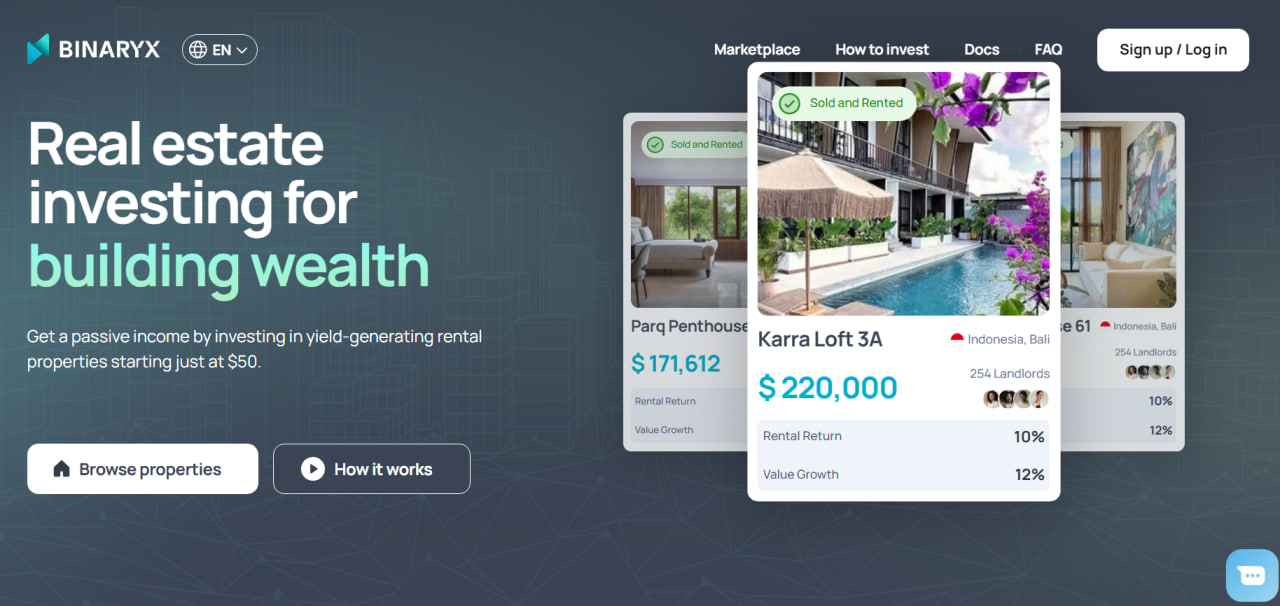
- Investment type: A portfolio of five rental property units (three in Bali and two in Montenegro) and three construction investments (two in Bali and one in Montenegro);
- Amount invested: $25,000 ($3000 for each rental property and $5000 for each construction investment);
- Projected returns: 70–100% overall ROI over a 5-year period;
- Potential outcome: The rental properties yielded an average annual percentage rate (APR) of 13%, with each property generating $1,950 over 5 years, resulting in total returns of $9,750 across five properties. The construction investments included two projects in Bali, which returned $1,750 each (35% ROI) after two years, and one project in Montenegro, which returned $1,000 (20% ROI) after one year. These properties were then converted to rentals, generating additional rental income at a 13% APR, with each converted property generating $1,950 over 3 years, totaling $5,850.
- Total returns: $21,100 (80.4%)
- Total portfolio value if not sold: $46,100
.png)
Figuring out Real Estate Syndication Legal Framework
Dealing with legal regulation can be boring, but nevertheless, it wouldn't be a complete article without this part. While investing through a syndication platform, you should be aware of four key legal aspects: securities laws, entity structure, contracts and agreements, and eligibility criteria.
Securities Laws to Comply With
Real estate syndication, whether traditional, crowdfunded, or tokenized, involves the sale of securities, which brings it under the securities laws.
- Traditional syndications require compliance with local securities acts, such as the Securities Act of 1933 in the US, which mandates the registration of securities with a local securities commission. Investors often require accreditation.
- Crowdfunding platforms often operate under specific laws concerning crowdfunding, which allow non-accredited investors to participate but enforce limits on the amount they can invest.
- Tokenization platforms still remain underregulated in most jurisdictions but generally fall under securities regulations, where tokenized assets must be registered or qualify for an exemption.
Entity Structure to Manage Liability, Taxation, and Operational Efficiency
- Limited Liability Company (LLC) is the most commonly used entity structure for all types of syndications; it provides flexibility and limits liability for investors and syndicators.
- Limited Partnership (LP) is often used in traditional syndications, where the syndicator gains unlimited liability and investors are limited in liability only up to their investment amount.
- Decentralized Autonomous Organization (DAO) is a new form of organization that has emerged in the crypto world. Still unregulated and underdeveloped, DAOs are blockchain-based entities governed by smart contracts to provide transparency and decentralized management. Most of the tokenized syndications run DAOs in parallel with LLCs.
Contracts and Agreements to Outline Roles, Responsibilities, and Expectations of All Parties Involved
- An operating agreement details the management structure, profit distribution, and operational procedures.
- A partnership subscription agreement (for LPs) is a contract between the syndication and the investor to specify the terms of the investment.
- Smart contracts (in tokenization platforms) are automated blockchain-based contracts that enforce the terms of agreements, such as the distribution of profits and transfer of ownership.
Eligibility Criteria to Determine Who Can Invest
- Accredited Investors: In traditional syndications, only accredited investors are typically allowed to invest. To become accredited, you should meet certain income or net worth thresholds.
- KYC/AML Compliance: All syndication platforms must comply with Know Your Customer (KYC) and Anti-Money Laundering (AML) regulations to verify the identity of investors and prevent fraud.
- Jurisdictional Restrictions: All syndication platforms must comply with the laws of the countries in which they operate and limit investors from sanctioned jurisdictions.
Final Words
Real estate syndication offers investors a flexible and affordable opportunity to diversify their portfolios and participate in the investment process with less time and liability costs. The emergence of crowdfunding and tokenization platforms has further democratized this investment model, allowing smaller investors to join with lower entry barriers.
Ultimately, real estate syndication represents an attractive opportunity to participate in the real estate market and extract not only yield comparable to the traditional way but even higher returns while matching your financial capabilities and preferences. Through modern syndication platforms, you can develop a viable strategy to expand your investment portfolio and achieve financial growth.
Articles you may be interested in

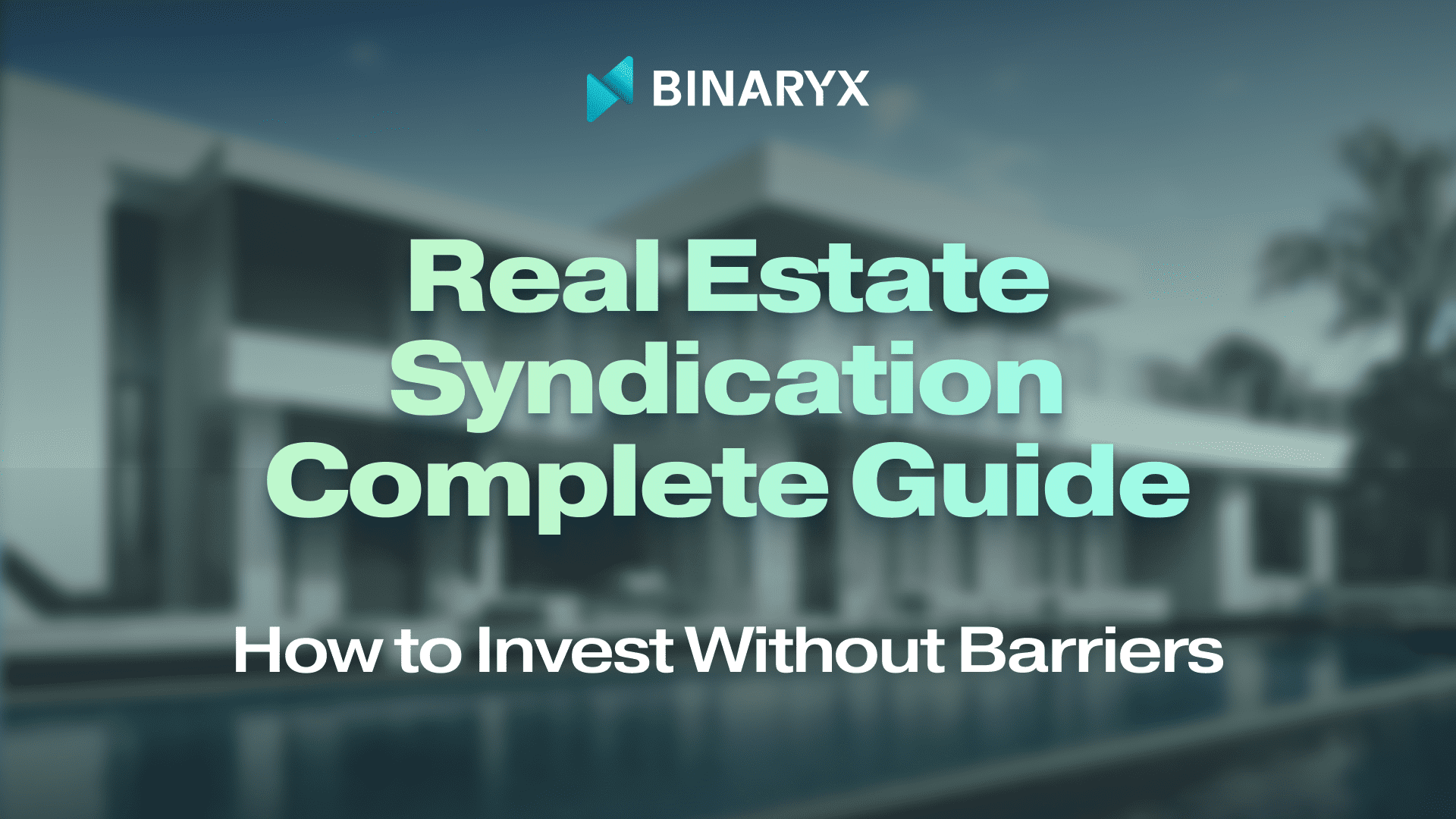

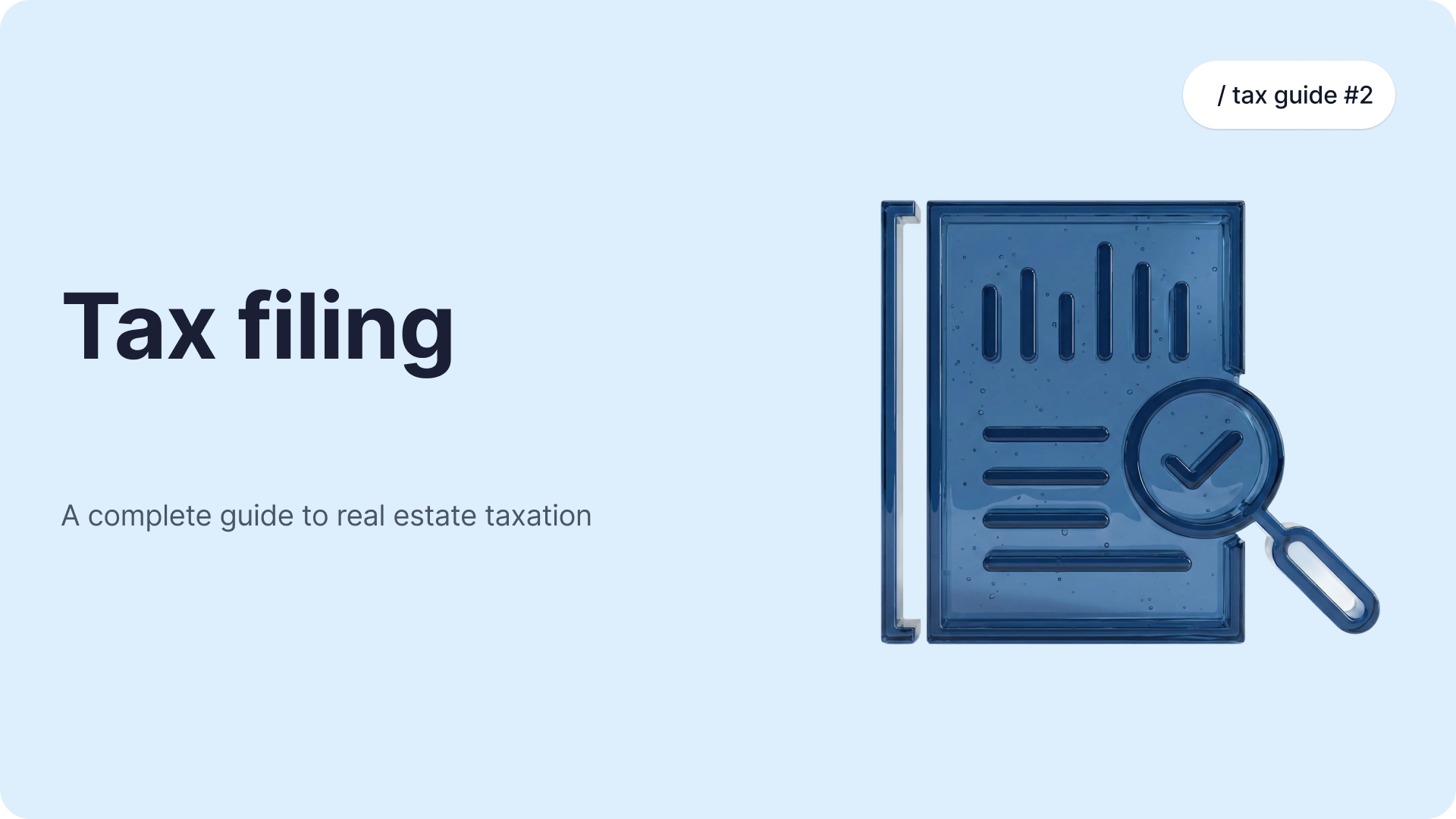
.png)
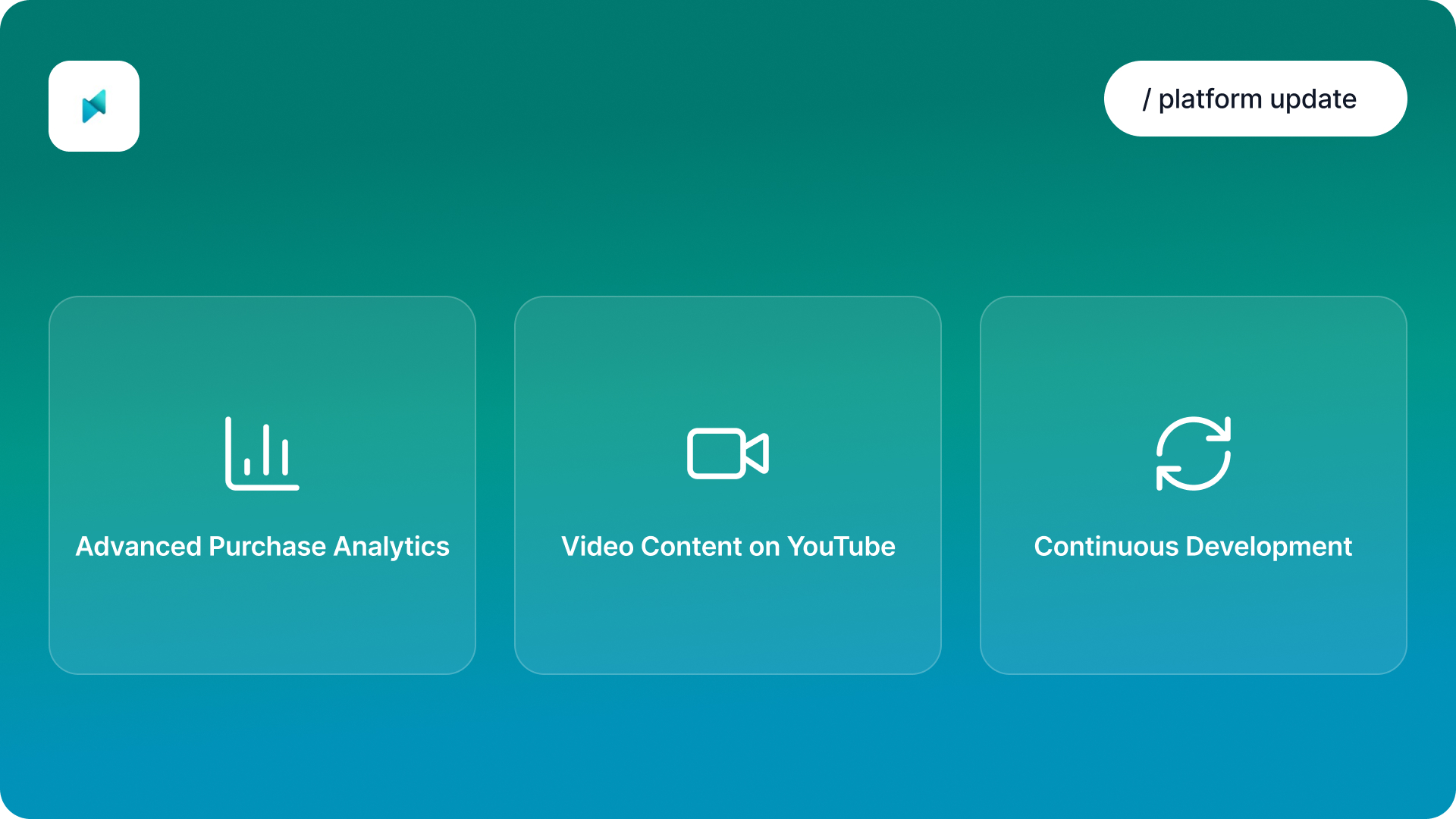
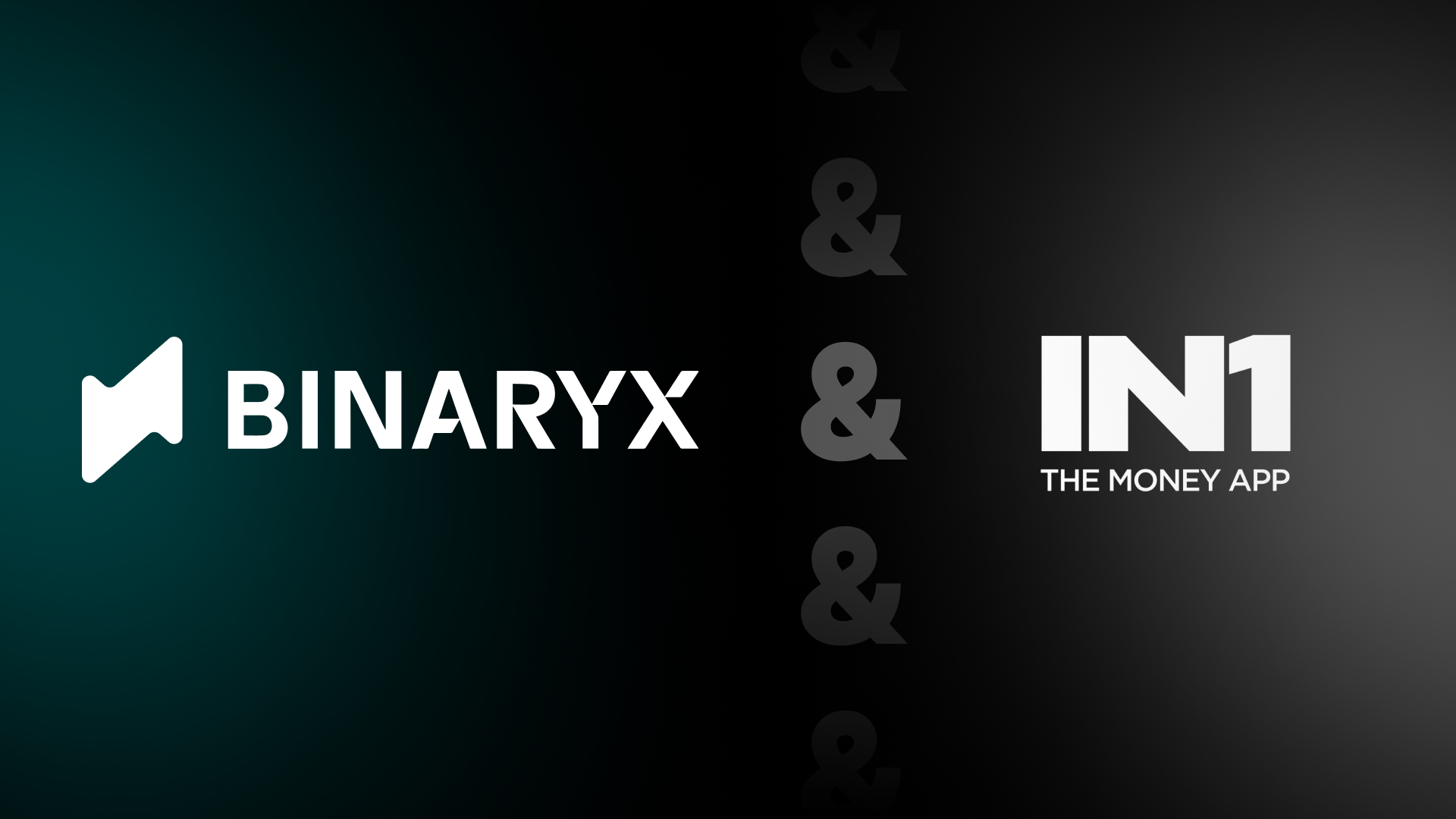
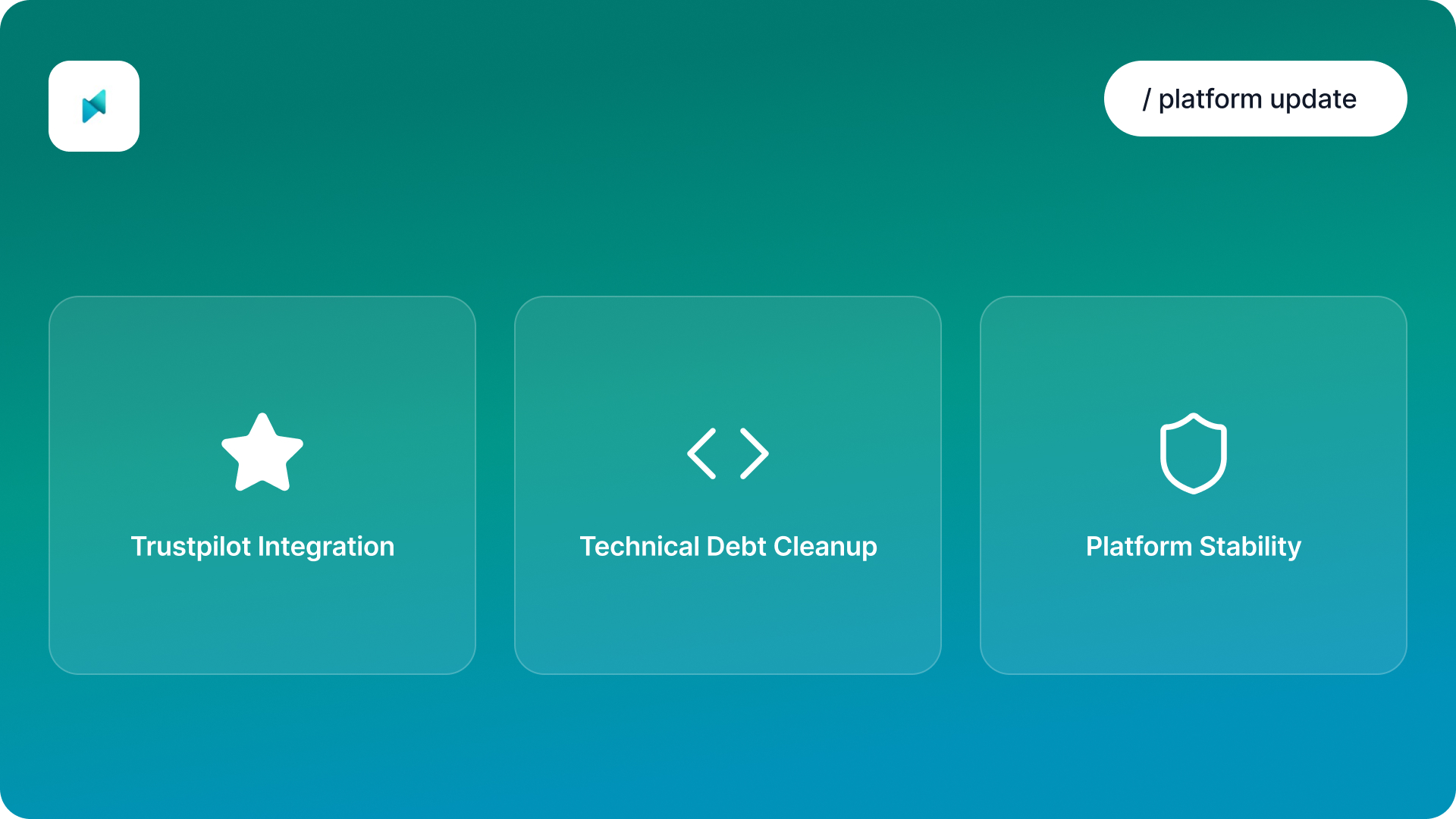
.png)

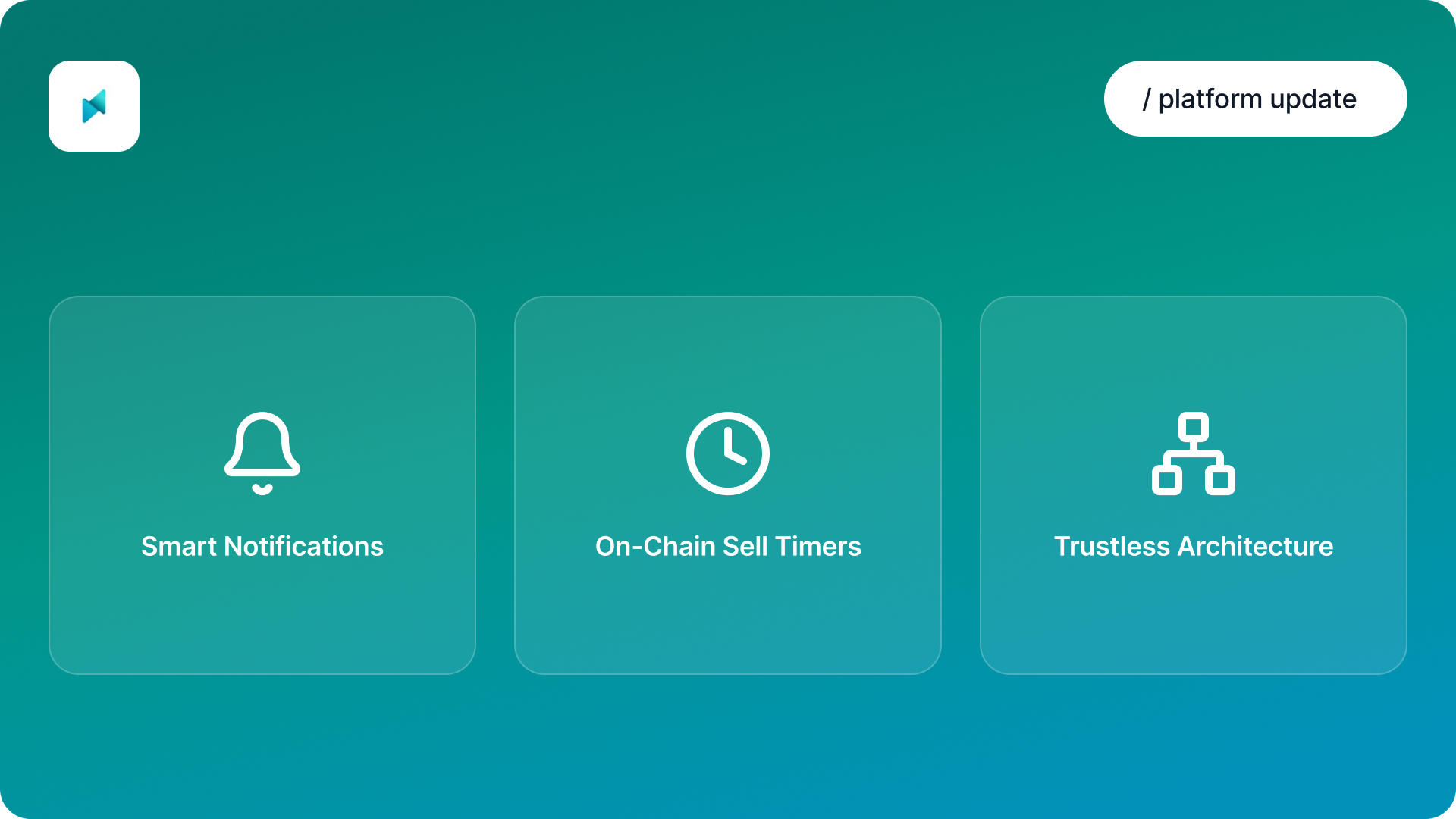

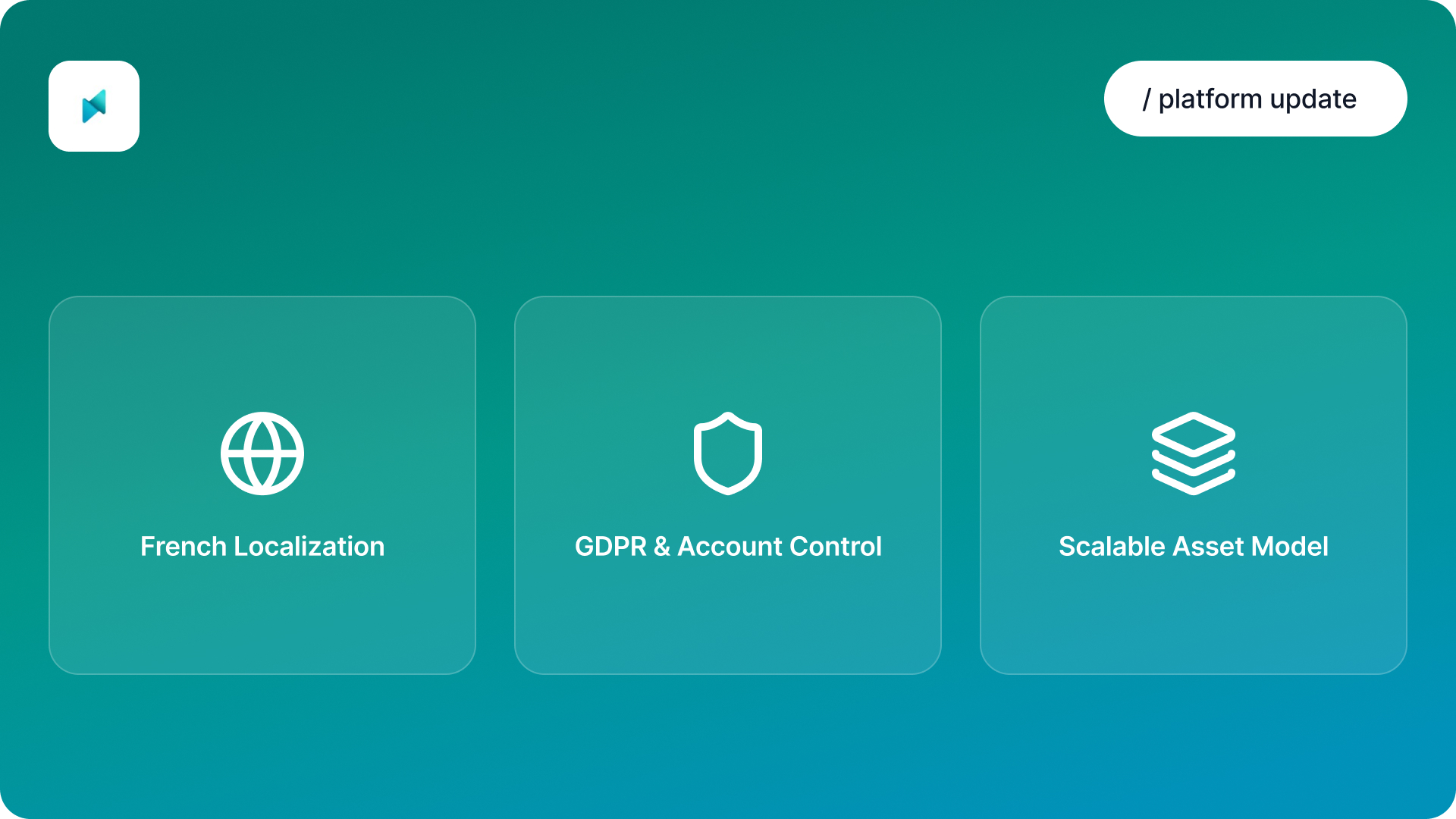
.jpeg)
.webp)